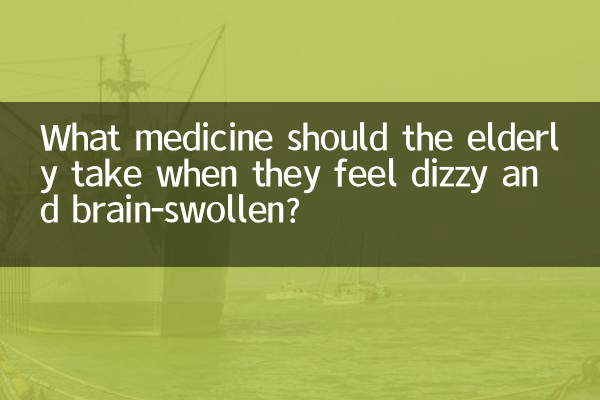What medicine should the elderly take when they feel dizzy and brain-swollen?
As the weather changes and the seasons change, the problem of dizziness and headache among the elderly has become one of the hot topics recently. Many family members and patients are concerned about how to alleviate this symptom through medication or daily conditioning. This article combines the hot discussions on the Internet in the past 10 days and compiled a structured data for you to help you understand the possible causes of dizziness and brain swelling in the elderly, recommended drugs and precautions.
1. Common causes of dizziness and brain swelling in the elderly

According to recent discussions on medical and health platforms, the main causes of dizziness and brain swelling in the elderly include the following categories:
| Cause classification | Specific performance |
|---|---|
| blood pressure problem | High blood pressure or low blood pressure can cause dizziness |
| Insufficient blood supply to the brain | Caused by cervical spondylosis, arteriosclerosis, etc. |
| anemia | Insufficient hemoglobin leads to hypoxia |
| Ear diseases | Such as otolithiasis, Meniere's disease |
| drug side effects | Some antihypertensive drugs or sedatives may cause |
2. Commonly used drugs for dizziness and brain swelling
The following are drugs for relieving dizziness and brain swelling that have been discussed frequently by doctors and patients recently:
| drug type | Representative medicine | Applicable symptoms | Things to note |
|---|---|---|---|
| Drugs that improve cerebral circulation | Ginkgo leaf extract, nimodipine | Dizziness caused by insufficient blood supply to the brain | It needs to be taken for a long time and should not be used together with anticoagulants. |
| antihypertensive drugs | Amlodipine, valsartan | Dizziness caused by high blood pressure | Blood pressure needs to be monitored regularly |
| blood tonic | Ferrous sulfate, folic acid | dizziness caused by anemia | Need to be combined with vitamin C to promote absorption |
| anti-faint medicine | betahistine, vertigo stop | Otolithiasis or Meniere's disease | Short-term use to avoid dependence |
3. Daily conditioning suggestions
In addition to drug treatment, recent health articles have also emphasized the following lifestyle adjustments:
1.Diet modification:Increase iron-rich foods (such as lean meat, spinach) and reduce high-salt and high-fat diets.
2.Moderate exercise:Such as walking and Tai Chi to promote blood circulation.
3.Sleep management:Ensure 7-8 hours of sleep every day and avoid getting up suddenly.
4.Regular inspection:Pay special attention to blood pressure, blood sugar and blood lipid indicators.
4. Precautions
1. Dizziness may be a sign of serious illness (such as cerebral infarction, cerebral hemorrhage). If it occurs frequently or is accompanied by vomiting or confusion, you need to seek medical attention immediately.
2. Drugs must be used under the guidance of a doctor and avoid adjusting the dosage on your own.
3. The elderly have reduced metabolic capacity and need to be alert to drug interactions.
Conclusion
The causes of dizziness and brain swelling in the elderly are complex, and treatment options need to be selected based on specific symptoms and examination results. The data compiled in this article are for reference only. Please follow your doctor's advice for actual medication. It has also been mentioned in recent hot topics that TCM conditioning (such as Gastrodia elata, Uncaria, etc.) is effective for some patients, and you can consult a professional TCM physician.

check the details

check the details